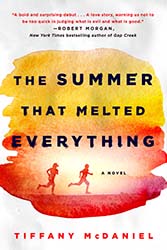 In recognition of the five finalists in fiction for the Ohioana Book Award, we’re featuring a question and answer with each author over the next few weeks.
In recognition of the five finalists in fiction for the Ohioana Book Award, we’re featuring a question and answer with each author over the next few weeks.
This week’s post features Tiffany McDaniel. Tiffany is an Ohio native whose writing is inspired by the rolling hills and buckeye woods of the land she knows. A poet and artist, she is the winner of The Guardian’s 2016 “Not-the-Booker Prize” for her debut novel, The Summer that Melted Everything. The novel was also a Goodreads Choice Award double nominee in both fiction and debut categories, is a current nominee for the Lillian Smith Book Award, and has recently been announced as a finalist for the Ohioana Literary Award and the Women’s Fiction Writers Association Star Award for Outstanding Debut.
Ohioana: What inspired you to write your novel?
Tiffany McDaniel: The Summer that Melted Everything started as a title. It was one of those hot Ohio summers that I felt like I was melting to a puddle on the green grass and dandelion ground. A little arranging of words and the title was born. I always say what inspires me are the characters. I’m inspired by their very presence, to do right by them and to write their truths to the best of my ability.
O: How does a sense of place inform your work? If that place happens to be Ohio, would love your thoughts on that.
TMcD: I have eight completed novels (yet to be published) and so far they’ve all taken place in Breathed, Ohio, a fictional town based on my childhood summers and school-year weekends I spent on the hilly acreage my father was left by his parents. The acreage is in the southeastern portion of Ohio, in the foothills of the Appalachians where the nights are mythical and starred while the hills sing you to sleep. It is a landscape that has shaped me as an author. I always say cut me open and fireflies will fly out of me in a moonshine madness.
 O: Can you tell us about your writing process?
O: Can you tell us about your writing process?
TMcD: I never outline. I think planning a story too much can domesticate it, and I like to preserve the story’s wild soul so it can beat on with the thunder. I like for the story to evolve with each new word and page that I write. It’s like turning on a faucet. Sometimes you only have a drop of water. Others times you have a flood. The thing about writing is that you just have to be present and ready with a big ol’ bowl to catch whatever comes out of that big ol’ faucet.
O: What would you like to tell us about the publishing process?
TMcD: While The Summer that Melted Everything is my first published novel, it’s actually my fifth or sixth novel written. I wrote my first novel when I was eighteen and wouldn’t get a publishing contract until I was twenty-nine for The Summer that Melted Everything. For me, it was a long eleven-year journey full of lots of rejection and perseverance. I was told my writing was too dark and too risky. For the most part, publishing has been an uphill battle, but the struggle has made me the author I am today. An author who knows the value of determination and the value of each and every reader.
O: What would you tell anyone who wants to write a novel?
TMcD: To never give up. Like I said, it took me eleven years to get a publisher. If you’re really serious about being a published author, be willing to put in the hard work and have plenty of patience should it come to that. The biggest thing is to never get discouraged. Don’t let rejection destroy you. Let it empower you.
O: What are you currently working on?
TMcD: I’ve returned to that very first novel I wrote when I was eighteen. It’s inspired by my mother’s coming-of-age in southern Ohio from the 1950s to the early 1970s. It feels like a good time to return to this story and to these characters.
O: Any inspirational quotes from other writers that you enjoy?
“Don’t talk about it; write.” Ray Bradbury, author of Dandelion Wine, one of my favorite books
“If you don’t like my peaches, don’t shake my tree.”-Shirley Jackson, author of We Have Always Lived in the Castle, another favorite book of mine.
My last quote isn’t from the author speaking outside of a work, but rather from a poet speaking within his work. From Ohio poet James Wright. From his poem, “To a Blossoming Pear Tree”:
“For if you could only listen,
I would tell you something,
Something human.”
It’s a beautiful quote because something human is the best thing we can hope to tell each other.
